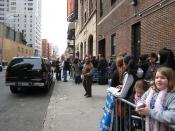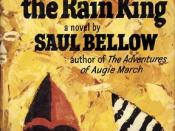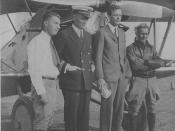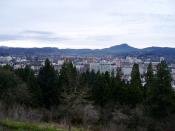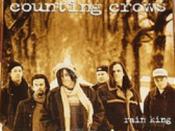Henderson the Rain King Saul Bellow "Henderson the Rain King" by Saul Bellow examines the journey of a middle- aged unhappy millionaire going through a mid-life crisis. Eugene Henderson has accumulated a large family and money yet he still feels unfulfilled. Dealing with the journey to face himself, he yearns to find the answer to the question that keeps plaguing his mind: "I want. I want." Eugene is not sure exactly what the phrase means, and he goes impulsively on a trip to Africa in hopes of supressing the voice inside of his head saying this.
Eugene Henderson, an often drunken oaf of a man, great in size, has many encounters with a couple of women, each of whom he has children with. His relationships with them end up in disaster, with each of them going their separate ways. He makes life for his children and his wife very difficult, mainly because he, himself was difficult.
This is basically due to Eugene's agressive and sometimes incompassionate personality.
Eugene tended to be a big, open wound of a person, and he just sort of bled all over everyone around him. For better or for worse, full of joy, full of sorrow, he just made a mess of everything. Despite his seemingly general lack of concern for everyone around him, we can see into Eugene's soul and feel his innate need for emotional sustenance.
Eugene's search for meaning begins after he subconsciously realizes that he's really just sleepwalking through life, when he attempts to channel ancestral spirits by playing his father's violin incessantly in his basement. After months of intense studying and practicing, he finds that he cannot supress the voice in his head that repeats "I want. I want", he then decides to spontaneously take a spiritual journey to Africa. He feels he needs a break from his family and his dreary normal existence, and feeling that "...it's the destiny of his generation of Americans to go out into the world and try to find the wisdom of life." Eugene's journey to Africa helps to further develop the story's main theme of the journey into the interior, the journey to face oneself. Eugene's search to find himself and quench his thirst to find the answer to the internal leads him seemingly far off the beaten track. When in Africa, Henderson has his guide show him remote, unusual places and different people. He meets two tribes, both of which he attempts to befriend and help. He nearly destroys the first tribe, when he breaks a main water supply in an attempt to "purify" it for them. This is the first part of the book where we see Henderson as a considerate person, genuinly trying to help out a tribe that he sees in trouble. When he fails disastrously, he leaves the village in shame. We notice now Eugene searching for his place in life and yearning to help people and possible save lives. When he was back home, he treated his relationships and people he was close with irreverently, examining their behavior and actions andanalyzing them, yet acting and speaking in limited and inconsiderate ways. He thrusted off his family and relationships without care and alienated himself. Africa allowed Eugene to become open and to use his innate qualities which were drawbacks in an artificial social world (New York): sheer strength, his instincts and rashness. Eugene found acceptance in the second tribe, and became good friends with the king, Dahfu. He reaches acclamation as a Sungo, or Rain King, when he is successful in "bringing rain" through a religious ritual he unknowingly took part in.
This is an important part of the book as during the time that Henderson is helping Dahfu in his attempts to capture a particular lion alive, Dahfu and Henderson have time to engage in philosophical conversations. It is during this time that we start to see resolve in Henderson's alienation. He treats all of the princes, hired guides and kings with equal respect, and values their conversation as equal to his own, something we did not see when he was in New York.
Africa was really just a place for Henderson to be able to test himself. It gave him an environment to be honest in, because he had could totally break free from prior relationships and deal with a whole new set of people and rules. This clean slate was crucial since he could not deal with the restraints of civilized, sophisticated New York. The book ends in a resolve of the conflict between the character versus himself. He draws necessary emotional sustenance from his experiences in Africa with African tribes. He finds that what he really wants to do is help and that his true destiny is as a healer, and now Henderson can return home, with plans to go to medical school.
Dealing with an intense and dark journey into the interior, "Henderson the Rain King" reverberates with truth, forcing readers to identify with Eugene's reconciliation of the persistant "I Want I want I want" voice that exists in his head, as well as our own. Eugene finds his purpose, and affirms it through his own adventures. Throughout the story, we're led along his journey, and by the end, we find closure in Eugene winning the conflict within himself. We see him not as a hero, but human, something we can all identify with.
